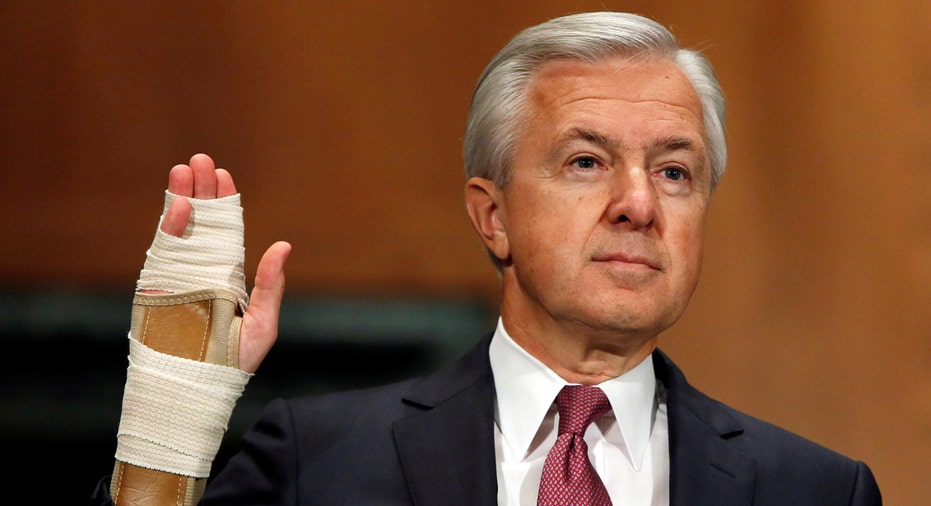In Defense of John Stumpf and Wells Fargo

If you watched Wells Fargo CEO John Stumpf get raked over the coals by the Senate Banking Committee on Tuesday, you might have noticed his right hand was bandaged, like a boxer before a pay-per-view match. I don’t know about you, but I want my money back. The guy got beat so bad, he would have been better off not showing up.
If I’d have been his executive coach, I would not even think about using his performance as a promotion video for my next endeavor. To be blunt, I thought Stumpf came across sort of weaselly. Everything was “the board of directors” this and “it was just 1% of our employees” that. He served up some pretty weak answers, if you ask me.
If Stumpf were my boss, I would have been extremely disappointed. If he truly held himself and his executive team accountable for the high-pressure retail sales goals that resulted in the creation of 2 million fake customer accounts over a five-year period, you wouldn’t know it from his responses.
Wells Fargo fired 5,300 employees for their misdeeds, but the practice was so widespread for so many years that it had to have been a systemic problem. And yet, the executive in charge of the nationwide cross-selling program, Carrie Tolstedt, will soon retire after 27 years with more than $100 million in accumulated stock and bonuses.
The fraud wasn’t simply the result of some bad apples who “don’t represent the company’s culture,” as Stumpf repeatedly said, but an overzealous, companywide goal of eight retail accounts per family that the bank had touted to investors and pushed on low-level retail branch employees for years. The company has since killed the program.
But here’s the thing. None of that makes Stumpf an executive who “should be criminally investigated” or a “gutless” leader who “should resign,” as Senator Elizabeth Warren suggested in her overwrought rant. I think her grandstanding accusations were unjust and her call for new legislation would do far more harm than good.
Let’s start with some facts. The numbers may sound big and the optics may look damning, but in my view, what occurred had negligible impact on consumers. Contrary to Warren’s repeated accusation that this was a “massive” fraud or scam, the sum total of fees the bank received from those 2 million fake accounts was all of $2.6 million. That means the average consumer was duped of a buck thirty. The company has since refunded the fees and agreed to a fine of $185 million.
To put that in perspective, Wells Fargo is the nation’s largest bank with 267,000 employees, a market cap of $230 billion, annual revenues of $90 billion and net income of $21 billion. And since politicians love to talk about how little corporations pay in taxes, the company paid more than $10 billion in federal income tax expense in each of the last three years for an effective tax rate of roughly 50%. Some corporate villain.
As for the cross-selling goal that Warren repeatedly tried to hang around Stumpf’s neck like it was some kind of illegal Ponzi scheme, that’s nothing more than a metric used to grow repeat sales with existing customers. It’s called a growth goal. Every company in every market has one.
Wells Fargo was apparently overly aggressive in the program’s implementation and lax in its oversight. There should have been controls against incentivizing bad behavior. And I’m sure the company has learned its lesson.
Another point that Warren hammered Stumpf on was the $30 rise in share price during the five years in question, increasing the value of his stock by more than $200 million. I seriously doubt if this nominal fraud had a material impact on share price. Besides, about a third of those gains have been erased in recent weeks.
On a human note, Stumpf’s past reads like that of so many top executives who worked their way up from nothing. He grew up as one of 11 children on a Minnesota dairy farm. He started at the bottom at Northwestern Bank, which ultimately merged with Wells Fargo, and spent 34 years at the combined company.
Don’t get me wrong. I’m not giving Stumpf a pass, but this was not massive fraud nor was it criminal behavior. Over the decades, Wells Fargo has been a rare good guy in the world of big banking. It would be a crime if this episode unduly tarnishes its image. The same is true of Stumpf.
To me, the real crime was Warren’s attempt at theatrical drama. I counted 1,160 words to Stumpf’s 94. She barely let him answer her questions before repeatedly cutting him off. Talk about overzealous. These are supposed to be hearings, not rantings.
As for what Warren was really after, the tell was in the final paragraph of her prepared soliloquy, “We need tough new laws to hold corporate executives personally accountable and we need tough prosecutors who have the courage to go after people at the top.” And there it is. Another Sarbanes Oxley or Dodd Frank in the making.
Just remember, this is all about $2.6 million. An Enron or sub-prime mortgage crisis, it is not.



















